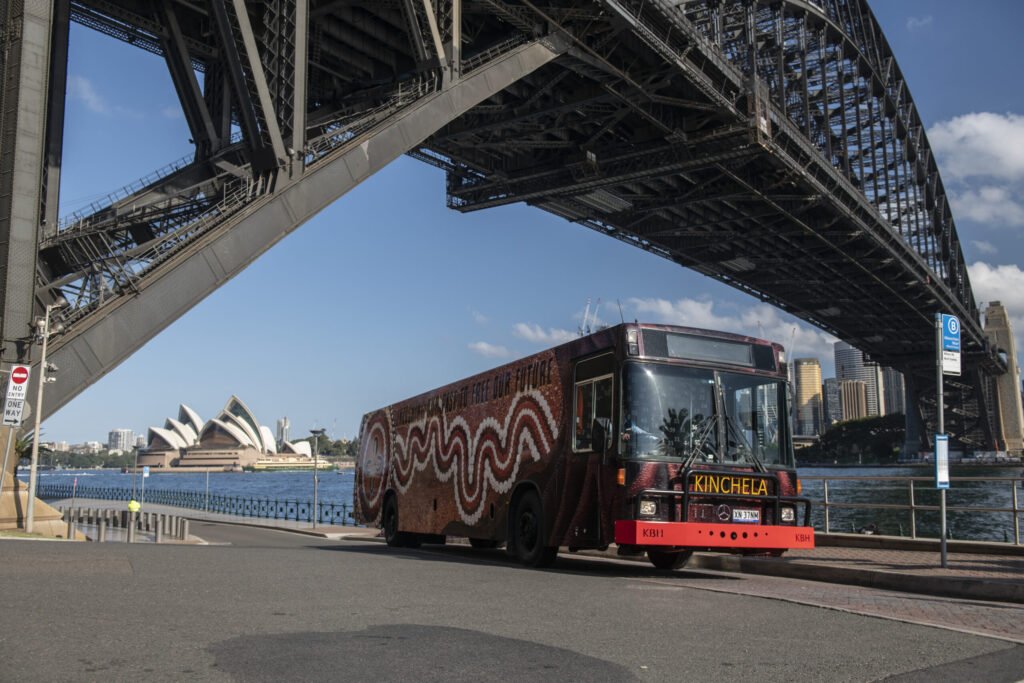
From the outside, it appears to onlookers be a typical city bus – one wrapped in breath-taking Aboriginal artwork. But step inside and you’ll quickly find that this bus takes you on a journey that is anything but typical. The bus – a Mobile Education Centre conceptualised and built by the Kinchela Boys Home Aboriginal Corporation (KBHAC) in partnership with the bus operator, CDC NSW – is part of the not-for-profit’s unique survivor-led approach to reconciliation and healing.
Affectionately nicknamed “Benny”, the bus provides a unique interactive space and experience for people to learn about the Stolen Generations and their connection to the Kinchela Aboriginal Boys Training Home – a ‘home’ run for over 50 years from 1924-1970 to house Aboriginal boys forcibly removed from their families.
Featuring part of the original wrought-iron gate from the Kinchela Boys Home, the Mobile Education Centre contains an interior exhibition that records the moving and often difficult memories and stories of its Stolen Generations survivors in a powerful historical record. The back half of the bus has been converted into a cinema with an audio-visual system and seats to show an animated film about the realities of life growing up at Kinchela Boys Home.
KBHAC CEO, Dr Tiffany McComsey explains that the stories from Kinchela Boys Home are important stories to tell. “This bus is very much like a sacred space. When you go inside the bus, you realise you are inside the KBH story,” she said.
Healing Through Partnership
Benny’s ongoing mission of education is made possible by a close partnership between KBHAC and CDC NSW, which ensures the vehicle is road worthy, looks after ongoing maintenance and provides bus drivers to get Benny out to communities across NSW.
The partnership is part of CDC NSW’s “Reflect” Reconciliation Action Plan (RAP), which aims to continue the journey of recognising the heritage, culture and history of First Nations people at every level of the organisation across its 2,000 employees.
CDC NSW CEO, Edward Thomas said the organisation’s vision for reconciliation is one where Aboriginal and Torres Strait Islander Peoples’ rights, cultures, achievements, and aspirations are recognised, and genuine inclusion is created via partnerships and opportunities.
“Partnering with KBHAC is hard proof of our dedication to participating in, and promoting, an accurate reflection of Australian history to facilitate a strong, inclusive and fair community,” he said.
According to Mr Thomas, CDC NSW is also committed to creating real and enduring opportunities for Aboriginal and Torres Strait Islander Peoples.
“As one of NSW’s largest bus operators, we are proud to be working to facilitate these opportunities through recruitment and professional development, as well as through our partnerships with Aboriginal and Torres Strait Islander industries, commercial service providers, and community controlled organisations,” he said.
Reflecting on the Past
As part of the existing partnership, KBHAC also plays a role in helping educate CDC NSW staff – it conducts ongoing cultural awareness training with employees at CDC NSW and provides mentoring for the organisation’s RAP working group.
Staff who have participated in the Mobile Education Centre experience are often deeply moved as they listen to the stories of the Uncles and understand the resilience and dignity of survivors. As CDC NSW continues on its reconciliation journey, the Mobile Education Centre will be visiting depots across the state to share the story with as many people as possible.

